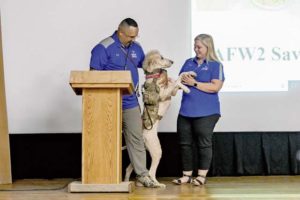by Lauren Russell
66th Air Base Group Public Affairs

HANSCOM AIR FORCE BASE, Mass. — A senior noncommissioned officer haunted for years by the grizzly images of a disastrous aircraft crash shared his personal story of resilience and recovery with Airmen during a training session at the Hanscom Air Force Base theater, Aug. 22.
In the wake of Air Force Chief of Staff Gen. David L. Goldfein’s Resiliency Tactical Pause directive, Master Sgt. Jose E. Rijos, Air Force Wounded Warrior ambassador, recounted the traumas of his career with his service dog, Cairo, at his side.
Originally a security forces Airman, he began his career at Muñiz Air National Guard Base, Puerto Rico. On Aug. 7, 2002, the call came in that a C-130 had gone down somewhere in the mountains. Rijos was assigned to the recovery team sent into the jungle to locate the wreckage.
“I wasn’t prepared for what we found,” said Rijos, currently the Massachusetts Air National Guard senior noncommissioned officer in charge of domestic operations.
The impact of the crash killed all 10 passengers onboard, a crew that Rijos had met with just days prior. Fragments of the aircraft and everything inside littered the rainforest floor.
“Then the next day, we were back at work,” he said. “But those images got stuck in my head.”
Although Rijos didn’t realize it at the time, what he endured had laid the foundation of his later-identified post-traumatic stress disorder that only worsened over the time it went untreated.
“I could tell that something was off with me,” Rijos said. “I just told myself this comes with the job, that I would decompress and I would be fine. I was choosing not to deal with it.”
With his belief of a negative stigma around mental health, Rijos assured himself he had everything under control, but as he progressed in his career, he found himself at another roadblock. Losing his father, health issues and problems with his new leadership only added to the weight on his shoulders.
“At this point, the punches were just coming from everywhere,” he said. “I fell into a depression.”
He finally had enough. Rijos sent a text message to his wife, telling her he was going to take his health back into his own hands. He drove himself to the closest Veterans Affairs hospital, where he stayed for the next 21 days, putting him on the road to recovery.
Still having good days and dark days but armed with new resources to cope with his trauma, Rijos was able to get back to his unit. It was there he said he received a call from the Air Force Wounded Warrior Program.
Rijos said he didn’t deem himself worthy of help from AFW2 because, to him, his wounds were not as severe as some of his wingmen. His recovery care coordinator assured him otherwise and told him that he could actually help other service members struggling with mental health find their path to recovery.
“Don’t be afraid to reach out and encourage your buddies to get help, because they just don’t know what to do with that pain,” Rijos said. “Because some of these guys, when they go, they really go.”
The AFW2 Program not only provided support to Rijos, but to his family as well. With support groups available for his wife and two daughters, his family was able to build their own tool kits on how to navigate the obstacles of trauma.
“It’s not like PTSD just goes away; it’s always there,” said Yadira Rijos, Jose’s wife, caregiver and AFW2 ambassador. “But (the AFW2 Program) has the right people to help.”
Rijos and his family travel from base to base, sharing their story and ongoing battle with PTSD in hopes to dismantle the stigma regarding mental health and arm service members with tools to seek help if they ever find themselves in a hole.
“I want to get back into the fight, and I’m not giving up,” Rijos said. “I’m being made whole again.”


